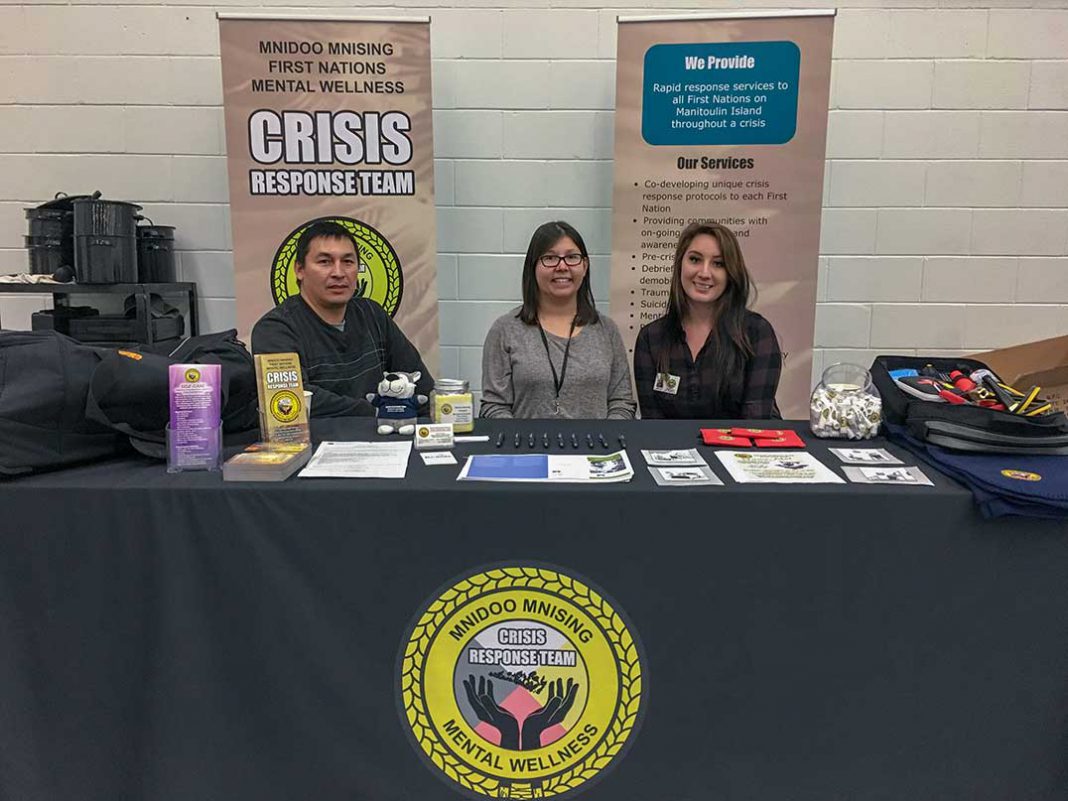MANITOULIN—Manitoulin Island is home to one of seven First Nations Mental Wellness Crisis Response Teams across the province. The Island team services the Island’s seven First Nation communities.
Based out of the Naandwechige-Gamig Wikwemikong Health Centre, its mission is to work in partnership “with the seven First Nations of Mnidoo Mnising to ensure effective and culturally appropriate mental wellness crisis response.”
The crisis response team is comprised of mental wellness support workers Lyle Peltier and Trisha Trudeau, crisis coordinator Serenity Sandford and manager Diane Jacko.
“The Ontario chiefs met and discussed the need for crisis response teams,” Mr. Peltier explained. “Because the Island had so many First Nations, the Island chiefs met and because Wiky already had a head start on it (crisis response) it was decided to base it from the health centre there.”
The program officially started in May, Ms. Sandford said.
The trio of Mr. Peltier, Ms. Trudeau and Ms. Sandford attended the National Addictions Awareness Week conference in M’Chigeeng last week, sharing information about the team and their offerings.
“Crisis is broad,” Mr. Peltier said, noting that it can be an individual crisis, such as the tragic loss of a loved one, or a community-wide event.
A recent example of the Crisis Response Team in action is the search in Little Current for a missing teenager in October. The team contacted the family and was available for on-scene mental health support for anyone who needed them at the Royal Canadian Legion search headquarters in Little Current.
The team explained they work with people of all ages—from children to elders. Some crisis situations include: suicide or homicide, assaults, car accidents, fire, floods or tornadoes, child abductions, near death experience or any highly emotional event deemed to be critical by the person involved.
The Crisis Response Team’s services include helping each First Nation community to develop its own set of protocols in dealing with crisis; providing communities with ongoing promotion and awareness activities; pre-crisis mitigation; debriefing, defusing and demobilization; suicide intervention and Mental Health First Aid; referrals to clinical and/or traditional services; and aftercare and client-centred safety plans.
In a crisis, the team will help to defuse the immediate situation, which involves explaining and normalizing the situation, demobilization (providing facts), providing education about symptoms and providing support and resources within 12 hours of the incident. The team will also do debriefing one to seven days following the incident as well as provide coordination and follow-up with community resources.
The team is in the midst of working with the United Chiefs and Councils of Manitoulin Anishnaabe Police to develop a protocol and have connected with the Manitoulin Health Centres.
“I’m really proud of where we’ve come in such a short period of time in terms of mental health initiatives,” said UCCM Chief of Police Rodney Nahwegahbow when contacted for comment.
Police Chief Nahwegahbow said his force has been in discussions with the team, but has not yet had to enlist their services for crisis. “But it’s the security of having them there. It takes the pressure off police to do their job.”
Police Chief Nahwegahbow commended Wiikwemkoong for taking the lead on the response team.
“It’s more than substantiated,” the police chief said of the need for such a team.
The team is currently operating on an 8 am to 4 pm basis, but is hoping to go to 24-hour service, contingent on provincial funding.
“We’re looking at recruiting people from all seven communities for volunteers and will do training,” Mr. Peltier said. Some of that training includes: CPR certification, Applied Suicide Intervention Skills Training (ASIST) and critical incident and lateral violence training.
“That way, if there is a crisis, there is one person there in that community that can start the process,” Ms. Trudeau said.
“We also offer land-based training,” he added, noting the team’s workshop on cedar tea held the day before at the conference.
“We want to bring that sense of belonging and sense of grounding,” Ms. Sandford said.
If you find yourself in a crisis or helping someone else in a crisis, the team offers these tips for coping: take deep and steady breaths, make positive self-statements and accept reactions as normal and natural; talk about your critical incident and stick to normal routines; good sleep, nutrition, exercise and eating habits are essential to staying healthy; and share feelings, thoughts or flashbacks.
For more information about the Mnidoo Mnising First Nations Mental Wellness Crisis Response Team, contact them at 705-859-2330 ext. 256.





